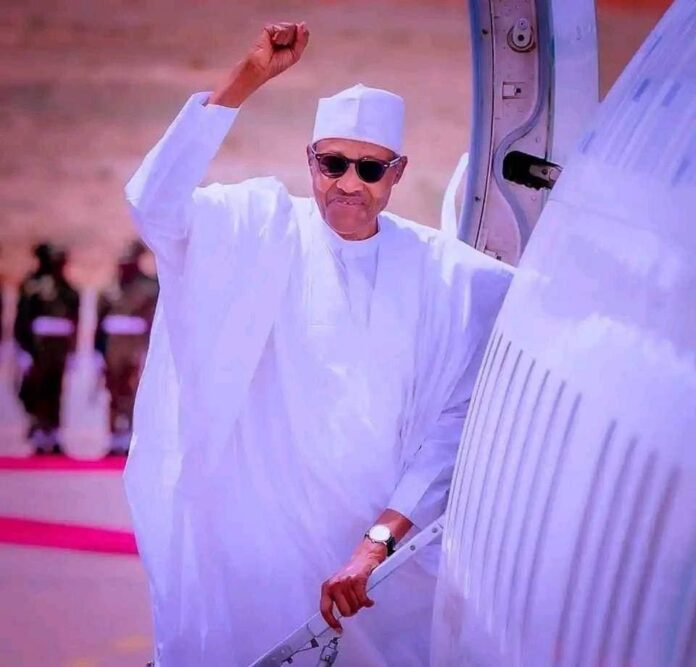By Abdullahi Inuwa
In the early hours of July 13, 2025, news broke that shook the nation to its core—Nigeria’s former President, Muhammadu Buhari GCFR, had passed away in a London clinic after a brief illness. As tributes continue to pour in from around the world, it is imperative to reflect on the legacy of a man whose name became synonymous with integrity, discipline, and unwavering commitment to Nigeria.
Muhammadu Buhari, born on December 17, 1942, in Daura, Katsina State, was a soldier, statesman, and patriot who served Nigeria at some of the most turbulent and transformative moments in its history. While his military career and subsequent role as Nigeria’s military Head of State between 1983 and 1985 remain part of his rich biography, it was his civilian presidency from 2015 to 2023 that cemented his status as the most honest Nigerian leader of the century.
From the outset of his public life, Muhammadu Buhari distinguished himself with personal discipline and incorruptibility. As military Head of State, he led a government that was widely known for its anti-corruption stance. His famous “War Against Indiscipline” campaign in the 1980s may have been controversial in its approach, but it left a lasting imprint on the national psyche—a reminder that public morality and orderliness are necessary for national development.
Upon his return to democratic politics, Buhari remained undeterred by electoral setbacks. Despite losing presidential elections three times—in 2003, 2007, and 2011—he never resorted to violence or incitement. Rather, he became a symbol of democratic resilience, eventually emerging victorious in 2015 by defeating an incumbent president for the first time in Nigerian history. His victory was a turning point that restored hope in electoral transparency and accountability.
Perhaps the most defining feature of Buhari’s presidency was his relentless fight against corruption. His administration empowered anti-graft agencies such as the Economic and Financial Crimes Commission (EFCC) and the Independent Corrupt Practices Commission (ICPC), with notable convictions of high-profile individuals. Though critics often pointed to perceived inconsistencies in his anti-corruption war, many Nigerians remember him as the only president who could not be personally linked to any known financial scandal or abuse of office.
He famously lived a frugal lifestyle and avoided the pomp and excesses typically associated with high political office. Even while serving as president, Buhari’s simplicity was evident—he retained a humble home in Daura and was known to use only the essential vehicles from the presidential fleet, rejecting extravagance. His personal integrity earned him the admiration of both local and international observers, including former U.S. President Barack Obama, who once described Buhari as “a man of principle.”
Beyond anti-corruption, Buhari focused on rebuilding Nigeria’s institutions. Under his administration, the Treasury Single Account (TSA) was fully implemented, saving billions of naira and curbing leakages in government spending. The Integrated Payroll and Personnel Information System (IPPIS) was expanded to eliminate ghost workers in the civil service.
He championed transparency in public procurement and enhanced the role of technology in governance. Nigeria’s digital economy began to blossom under his guidance, with major reforms in the National Identity Number (NIN) system and digital payment infrastructure.
Though he faced serious challenges—particularly the persistent Boko Haram insurgency and growing banditry in the North West—Buhari made commendable efforts in equipping the military and reclaiming territories once held by terrorists. His government negotiated the return of some of the abducted Chibok and Dapchi girls and undertook critical reforms in defense procurement.
On infrastructure, his administration embarked on some of the most ambitious road, rail, and power projects in recent memory. The Second Niger Bridge, Lagos-Ibadan Expressway, Abuja-Kaduna-Zaria-Kano Road, and several railway corridors became reality under his leadership. His belief in Nigeria’s industrial and agricultural self-sufficiency also led to the Anchor Borrowers’ Programme, which improved food production and reduced rice importation drastically.
When Buhari left office in May 2023, he did so without fanfare. He returned to his hometown of Daura, Katsina State, refusing the perks of retirement and quietly withdrawing from the political scene. He never interfered in the affairs of his successor and never sought to manipulate his way back into national relevance.
Even in death, Buhari remains a symbol of rare honesty in public service. Tributes from global leaders—including the United Nations Secretary-General, ECOWAS leadership, and African Union chairpersons—highlight his incorruptibility and contributions to African democracy. In Nigeria, both the ruling and opposition parties have set aside differences to honor his memory.
Though often misunderstood, Buhari earned the love and admiration of everyday Nigerians who saw in him the father figure the nation needed—stern, focused, and sincere. To the talakawas (ordinary people), he was a president who lived like them, spoke their language, and remained accessible even from the highest office in the land.
Conclusion
President Muhammadu Buhari’s death marks the end of an era—but it also serves as a powerful reminder that leadership built on integrity, discipline, and patriotism can still inspire hope. He may not have solved all of Nigeria’s challenges, but he restored something that had long been lost: a belief that honesty in leadership is not just possible—it is necessary.
As Nigerians mourn the man from Daura, they also celebrate his towering legacy. Muhammadu Buhari will be remembered not just as a former president or military general, but as a man who walked through Nigeria’s corridors of power without ever soiling his hands.
May Allah grant him Aljannatul Firdaus.
Abdullahi Inuwa Social Commentator ainuwa303@gmail.com




